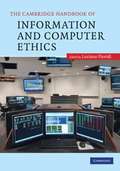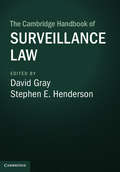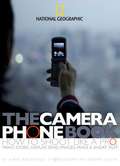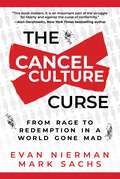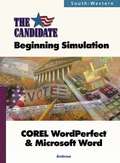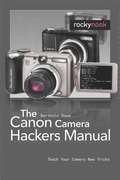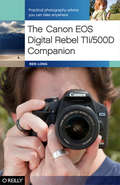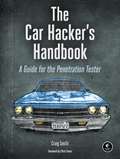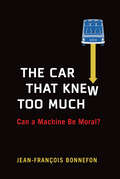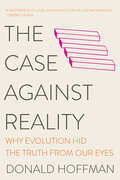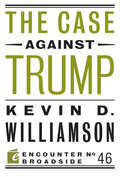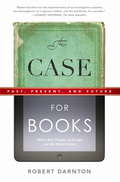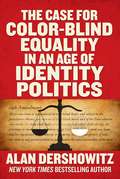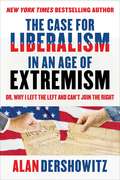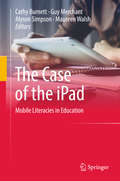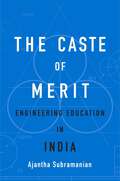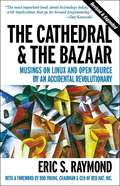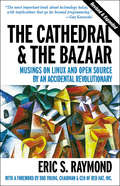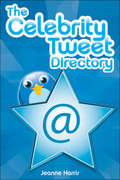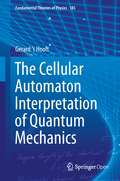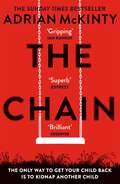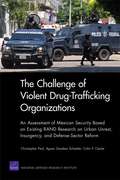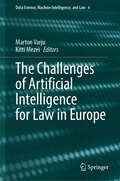- Table View
- List View
The Cambridge Handbook of English Corpus Linguistics
by Douglas Biber Randi Reppen Biber, Douglas and Reppen, RandiThe Cambridge Handbook of English Corpus Linguistics (CHECL) surveys the breadth of corpus-based linguistic research on English, including chapters on collocations, phraseology, grammatical variation, historical change, and the description of registers and dialects. The most innovative aspects of the CHECL are its emphasis on critical discussion, its explicit evaluation of the state of the art in each sub-discipline, and the inclusion of empirical case studies. While each chapter includes a broad survey of previous research, the primary focus is on a detailed description of the most important corpus-based studies in this area, with discussion of what those studies found, and why they are important. Each chapter also includes a critical discussion of the corpus-based methods employed for research in this area, as well as an explicit summary of new findings and discoveries.
The Cambridge Handbook of Information and Computer Ethics
by Luciano FloridiInformation and Communication Technologies (ICTs) have profoundly changed many aspects of life, including the nature of entertainment, work, communication, education, healthcare, industrial production and business, social relations and conflicts. They have had a radical and widespread impact on our moral lives and hence on contemporary ethical debates. The Cambridge Handbook of Information and Computer Ethics provides an ambitious and authoritative introduction to the field, with discussions of a range of topics including privacy, ownership, freedom of speech, responsibility, technological determinism, the digital divide, cyber warfare, and online pornography. It offers an accessible and thoughtful survey of the transformations brought about by ICTs and their implications for the future of human life and society, for the evaluation of behaviour, and for the evolution of moral values and rights. It will be a valuable book for all who are interested in the ethical aspects of the information society in which we live.
The Cambridge Handbook of Surveillance Law
by Henderson David Gray Stephen E.Surveillance presents a conundrum: how to ensure safety, stability, and efficiency while respecting privacy and individual liberty. From police officers to corporations to intelligence agencies, surveillance law is tasked with striking this difficult and delicate balance. That challenge is compounded by ever-changing technologies and evolving social norms. Following the revelations of Edward Snowden and a host of private-sector controversies, there is intense interest among policymakers, business leaders, attorneys, academics, students, and the public regarding legal, technological, and policy issues relating to surveillance. This handbook documents and organizes these conversations, bringing together some of the most thoughtful and impactful contributors to contemporary surveillance debates, policies, and practices. Its pages explore surveillance techniques and technologies; their value for law enforcement, national security, and private enterprise; their impacts on citizens and communities; and the many ways societies do - and should - regulate surveillance.
The Camera Phone Book
by Aimee BaldridgeMarketing experts predict that by 2009, nearly 90% of all cell phones will contain a camera, as manufacturers race to create cheaper, easier-to-use models with more sophisticated cameras, more pixels, flash units and even multiple lenses. Already revolutionizing audiovisual communication, it's a trend that will only grow more explosively—and who better than National Geographic to create a how-to book aimed directly at the millions who carry a camera phone everywhere and want to make the most of it? Created by two top professionals, this generously illustrated nuts-and-bolts guide is the first of its kind to treat these units as genuine cameras instead of novelties, and the only one to include a full-color photo-essay demonstrating the full capabilities of the latest camera phones. In five easy-to-read chapters, the book explains how to choose good equipment; take better pictures; and store, print and send the best images. Readers will find practical tips on preventing or repairing water damage, protecting easily-scratched lenses inside pockets and purses, and retrieving accidentally-erased images. They'll also learn to access the events, advice, and opportunities of the burgeoning camera phone community, from film festivals to news organizations, moblogs, and more. Featuring the technical savvy of CNet.com's Aimee Baldridge and the creative skill of National Geographic photographer Robert Clark, a camera phone pioneer, this compact yet comprehensive reference combines up-to-the-minute expertise with superb examples, at an inexpensive price that makes it a perfect gift book—or an ideal impulse buy.
The Cancel Culture Curse: From Rage to Redemption in a World Gone Mad
by Evan Nierman Mark SachsIn a groundbreaking first, cancel culture and its core elements are clearly defined, and a convincing case is made against this fundamentally un-American practice. Cancel culture is an insidious force in society today. In the seconds it takes to make one regrettable social media post—or wind up on the wrong side of a false accusation or misunderstanding—reputations, relationships, and careers are destroyed. Have we entered an era when people cannot make mistakes; where no apology or change of heart can ever deliver forgiveness? Making a comeback used to be a celebrated American ideal. But have the roads to redemption been permanently blocked by internet mobs seeking vengeance? In The Cancel Culture Curse, global crisis manager Evan Nierman and his colleague Mark Sachs examine the impact of cancel culture in today&’s media-driven world. The authors also explore the history of cancel culture and the trends that have fostered it, defining the telltale elements that are hallmarks of such campaigns. Nierman and Sachs provide fascinating case studies and interviews with well-known victims of cancel culture, including philosopher Peter Boghossian, Mumford & Sons cofounder Winston Marshall, and &“San Francisco Karen,&” among others. Also featured, is a playbook for rebounding from public shame, helping readers avoid becoming the latest targets of &“cancel vultures&” who enjoy picking apart the remains of those left to die on the side of the Internet highway.
The Candidate: Beginning Simulation for COREL WordPerfect and Microsoft Word
by Ann P. AmbroseThe Candidate is a beginning word processing simulation that is designed to develop word processing skills while completing tasks such as formatting letters, memorandums, tables, press releases, and reports.
The Canon Camera Hackers Manual
by Berthold DaumThe book addresses "geeky" owners of Canon consumer cameras who would like to explore the possibilities of their cameras, and eventually tweak them to do things way beyond their original specifications, such as - RAW file (or DNG) support in addition to the camera's JPEG output - Manual control for aperture, shutter speed, and ISO - Expand shutter speeds way beyond the specification limits - Enable bracketing The hacks are based on the Canon Hack Development Kit (CHDK), a free software maintained by a group of enthusiasts. Many scripts are already published on the web. The book teaches how to use existing scripts and how to write new ones. Canon cameras, especially their consumer lines of PowerShot/IXUS cameras, allow the user to temporarily upload so called add-ons into the camera through the memory card. The next time the camara is switched on, the add-on is active, when the camera is switched off, the camera returns to its original state, so there is no risk of loosing the manufacturers warranty.
The Canon EOS Digital Rebel T1i/500D Companion: Practical Photography Advice You Can Take Anywhere
by Ben LongThrough easy-to-follow lessons, this handy book offers a complete class on digital photography, tailored specifically for people who use the Canon EOS Digital Rebel T1i/500D. This is not your typical camera guide: rather than just show you what all the buttons do, it teaches you how to use the Digital Rebel's features to make great photographs -- including professional-looking images of people, landscapes, action shots, close-ups, night shots, HD video, and more. With Ben Long's creative tips and technical advice, you have the perfect, camera-bag-friendly reference that will help you capture stunning pictures anywhere, anytime. The Canon EOS Digital Rebel T1i/500D Companion will show you how to:Take creative control and go beyond automatic settings Learn the basic rules of composition Capture decisive moments, including fast-moving objects Discover ways to use a flash indoors and outdoors Learn about different lenses, and the best time to use them Understand the options for shooting RAW, and whether it's right for you Use the Digital Rebel's ability to shoot high definition video
The Car Hacker's Handbook: A Guide for the Penetration Tester
by Craig SmithModern cars are more computerized than ever. Infotainment and navigation systems, Wi-Fi, automatic software updates, and other innovations aim to make driving more convenient. But vehicle technologies haven’t kept pace with today’s more hostile security environment, leaving millions vulnerable to attack.The Car Hacker’s Handbook will give you a deeper understanding of the computer systems and embedded software in modern vehicles. It begins by examining vulnerabilities and providing detailed explanations of communications over the CAN bus and between devices and systems.Then, once you have an understanding of a vehicle’s communication network, you’ll learn how to intercept data and perform specific hacks to track vehicles, unlock doors, glitch engines, flood communication, and more. With a focus on low-cost, open source hacking tools such as Metasploit, Wireshark, Kayak, can-utils, and ChipWhisperer, The Car Hacker’s Handbook will show you how to:–Build an accurate threat model for your vehicle–Reverse engineer the CAN bus to fake engine signals–Exploit vulnerabilities in diagnostic and data-logging systems–Hack the ECU and other firmware and embedded systems–Feed exploits through infotainment and vehicle-to-vehicle communication systems–Override factory settings with performance-tuning techniques–Build physical and virtual test benches to try out exploits safelyIf you’re curious about automotive security and have the urge to hack a two-ton computer, make The Car Hacker’s Handbook your first stop.
The Car That Knew Too Much: Can a Machine Be Moral?
by Jean-Francois BonnefonThe inside story of the groundbreaking experiment that captured what people think about the life-and-death dilemmas posed by driverless cars.Human drivers don't find themselves facing such moral dilemmas as "should I sacrifice myself by driving off a cliff if that could save the life of a little girl on the road?" Human brains aren't fast enough to make that kind of calculation; the car is over the cliff in a nanosecond. A self-driving car, on the other hand, can compute fast enough to make such a decision--to do whatever humans have programmed it to do. But what should that be? This book investigates how people want driverless cars to decide matters of life and death. In The Car That Knew Too Much, psychologist Jean-François Bonnefon reports on a groundbreaking experiment that captured what people think cars should do in situations where not everyone can be saved. Sacrifice the passengers for pedestrians? Save children rather than adults? Kill one person so many can live? Bonnefon and his collaborators Iyad Rahwan and Azim Shariff designed the largest experiment in moral psychology ever: the Moral Machine, an interactive website that has allowed people --eventually, millions of them, from 233 countries and territories--to make choices within detailed accident scenarios. Bonnefon discusses the responses (reporting, among other things, that babies, children, and pregnant women were most likely to be saved), the media frenzy over news of the experiment, and scholarly responses to it. Boosters for driverless cars argue that they will be in fewer accidents than human-driven cars. It's up to humans to decide how many fatal accidents we will allow these cars to have.
The Case Against Reality: Why Evolution Hid The Truth From Our Eyes
by Donald HoffmanCan we trust our senses to tell us the truth? Challenging leading scientific theories that claim that our senses report back objective reality, cognitive scientist Donald Hoffman argues that while we should take our perceptions seriously, we should not take them literally. How can it be possible that the world we see is not objective reality? And how can our senses be useful if they are not communicating the truth? Hoffman grapples with these questions and more over the course of this eye-opening work. Ever since Homo sapiens has walked the earth, natural selection has favored perception that hides the truth and guides us toward useful action, shaping our senses to keep us alive and reproducing. We observe a speeding car and do not walk in front of it; we see mold growing on bread and do not eat it. These impressions, though, are not objective reality. Just like a file icon on a desktop screen is a useful symbol rather than a genuine representation of what a computer file looks like, the objects we see every day are merely icons, allowing us to navigate the world safely and with ease. The real-world implications for this discovery are huge. From examining why fashion designers create clothes that give the illusion of a more “attractive” body shape to studying how companies use color to elicit specific emotions in consumers, and even dismantling the very notion that spacetime is objective reality, The Case Against Reality dares us to question everything we thought we knew about the world we see.
The Case Against Trump
by Kevin D. WilliamsonDonald Trump, who rocketed to the top of the polls in the early GOP primary race, is an unlikely Republican front-runner: a longtime supporter of Democratic politicians with a history of taking views opposed to those of mainstream conservatives. A household name for his reality-television show and his tawdry tabloid history, he has connected with an underappreciated strain of right-wing populists by focusing his fire on a single issue: immigration.In this Broadside, Kevin D. Williamson takes a hard look at the Trump phenomenon and the failures of the national Republican leadership - and defects in our national character - that gave it life. Trump may or may not be in the race for the long haul, but in either case, Trumpism will remain a force.
The Case for Books: Past, Present, and Future
by Robert DarntonThe era of the printed book is at a crossroad. E-readers are flooding the market, books are available to read on cell phones, and companies such as Google, Amazon, and Apple are competing to command near monopolistic positions as sellers and dispensers of digital information. Already, more books have been scanned and digitized than were housed in the great library in Alexandria. Is the printed book resilient enough to survive the digital revolution, or will it become obsolete? In this lasting collection of essays, Robert Darnton?an intellectual pioneer in the field of this history of the book?lends unique authority to the life, role, and legacy of the book in society.
The Case for Color-Blind Equality in an Age of Identity Politics
by Alan DershowitzIn The Case for Color-Blind Equality in an Age of Identity Politics, Alan Dershowitz—New York Times bestselling author and one of America&’s most respected legal scholars—analyzes the current battles over issues of diversity and our rapidly changing ideas about what true diversity is. Alan Dershowitz has been called &“one of the most prominent and consistent defenders of civil liberties in America&” by Politico and &“the nation&’s most peripatetic civil liberties lawyer and one of its most distinguished defenders of individual rights&” by Newsweek. He is also a fair-minded and even-handed expert on civil liberties and constitutional rights, and in this book offers his knowledge and insight to help readers understand the war being waged against meritocracy and equal protection of the law by so-called progressive advocates. The Case for Color-Blind Equality in an Age of Identity Politics is an analysis of every aspect of the current fight against true diversity—diversity of philosophy, background, and opinion, rather than the more surface-level diversity of race, religion, and location. It examines the United States&’s history of systemic racism, debates about affirmative action, and ongoing reckoning with issues of bigotry against groups such as Asians, Blacks, and Jews, with an eye toward fairly balancing the concerns of a diverse populace. In the end, The Case for Color-Blind Equality in an Age of Identity Politics represents an icon in American law and politics exploring the current rapidly changing attitudes toward meritocracy, personal identity, and the preservation of civil liberties for all citizens, regardless of background, race, class, or creed. It is essential reading for anyone interested in or concerned about identity politics, racial issues, and true diversity and fairness in America.
The Case for Liberalism in an Age of Extremism: or, Why I Left the Left But Can't Join the Right
by Alan Dershowitz&“Maybe the question isn&’t what happened to Alan Dershowitz. Maybe it&’s what happened to everyone else.&”—PoliticoIn The Case for Liberalism in an Age of Extremism, Alan Dershowitz—New York Times bestselling author and one of America&’s most respected legal scholars—makes a classical liberal argument for centrist government in the US, as the Founding Fathers and the Constitution intended. Alan Dershowitz has been called &“one of the most prominent and consistent defenders of civil liberties in America&” by Politico and &“the nation&’s most peripatetic civil liberties lawyer and one of its most distinguished defenders of individual rights&” by Newsweek. Yet he has come under intense criticism for his consistent classical liberalism in the face of a rapidly polarizing political landscape and for his steadfast support of centrist governance over either &“progressive&” or reactionary radicalism. The Case for Liberalism in an Age of Extremism is a defense of liberalism and its renewed relevance today. It makes the case for classic liberal values and programs over radical-left and reactionary right-wing agendas, and for centrism over extremism in general, showing why the United States has thrived throughout history because of its enduringly centrist base. It seeks to restore contemporary liberalism to its important place in the American political landscape, and attempts to persuade centrists from both the left and right—who may today call themselves progressives or moderate conservatives—that they, too, belong in the big tent of centrist liberalism. As a professor for half a century, Dershowitz never told students what values to accept or which candidates to support, but helped guide them to conclusions based on their own sets of values. He does the same in this book. A guide for all readers, rather than a piece of political advocacy for one party or another, The Case for Liberalism in an Age of Extremism is Alan Dershowitz&’s argument for classical liberal values and their role in forming just societies and protecting against the dangers of extremism, just as they must today. It is essential reading for anyone interested in or concerned about political polarization on both the far-right and -left, and for everyone seeking a middle path between the extremes.
The Case of the Creepers (Unofficial Minecraft Mysteries #4)
by Winter MorganAll the Creepers have vanished from the Minecraft universe, and the people are starting to get worried. Though some believe that their disappearance is a good thing, others fear that it might be the start of an even more sinister plot.Edison and Billy decide to use their sleuthing skills to find the truth of the situation, and their investigation takes them all around the Overworld. But the missing Creepers aren’t easy to find. With the help of new friends, Edison and Billy search for the missing mobs—but if they find the Creepers, will they be in danger themselves? Join Edison and Billy as they solve their greatest mystery yet in the fourth installment of the Unofficial Minecraft Mystery series!
The Case of the iPad
by Cathy Burnett Guy Merchant Alyson Simpson Maureen WalshThis book brings together an international group of literacy studies scholars who have investigated mobile literacies in a variety of educational settings. Approaching mobility from diverse theoretical perspectives, the book makes a significant contribution to how mobile literacies, and tablets in particular, are being conceptualised in literacy research. The book focuses on tablets, and particularly the iPad, as a prime example of mobile literacies, setting this within the broader context of literacy and mobility. The book provides inspiration and direction for future research in mobile literacies, based upon 16 chapters that investigate the relationship between tablets and literacy in diverse ways. Together they address the complex and multiple forces associated with the distribution of the technologies themselves and the texts they mediate, and consider how apps, adults and children work together as iPads enter the mesh of practices and material arrangements that constitute the institutional setting.
The Caste of Merit: Engineering Education in India
by Ajantha SubramanianJust as Americans least disadvantaged by racism are most likely to call their country post‐racial, Indians who have benefited from upper-caste affiliation rush to declare their country a post‐caste meritocracy. Ajantha Subramanian challenges this belief, showing how the ideal of meritocracy serves the reproduction of inequality in Indian education.
The Cathedral & the Bazaar, Revised Edition
by Eric S. RaymondThe Cathedral & the Bazaar is a must for anyone who cares about the future of the computer industry or the dynamics of the information economy. This revised and expanded paperback edition includes new material on open source developments in 1999 and 2000. Raymond's clear and effective writing style accurately describing the benefits of open source software has been key to its success.
The Cathedral & the Bazaar: Musings on Linux and Open Source by an Accidental Revolutionary
by Eric S. RaymondOpen source provides the competitive advantage in the Internet Age. According to the August Forrester Report, 56 percent of IT managers interviewed at Global 2,500 companies are already using some type of open source software in their infrastructure and another 6 percent will install it in the next two years. This revolutionary model for collaborative software development is being embraced and studied by many of the biggest players in the high-tech industry, from Sun Microsystems to IBM to Intel.The Cathedral & the Bazaar is a must for anyone who cares about the future of the computer industry or the dynamics of the information economy. Already, billions of dollars have been made and lost based on the ideas in this book. Its conclusions will be studied, debated, and implemented for years to come. According to Bob Young, "This is Eric Raymond's great contribution to the success of the open source revolution, to the adoption of Linux-based operating systems, and to the success of open source users and the companies that supply them."The interest in open source software development has grown enormously in the past year. This revised and expanded paperback edition includes new material on open source developments in 1999 and 2000. Raymond's clear and effective writing style accurately describing the benefits of open source software has been key to its success. With major vendors creating acceptance for open source within companies, independent vendors will become the open source story in 2001.
The Celebrity Tweet Directory
by Jeanne HarrisTweet along with your favorite celebs! Divided by category with celebrities listed in alphabetical order so you can easily find your favorite celeb, The Celebrity Tweet Directory tweets you to conversations with hundreds of well-known actors, comedians, singers, politicians, sports figures, and more. With this handy guide, you can flutter into the world of celebrity chatter and experience how they reveal themselves in a way you don't see anywhere else. With this portable directory, you'll quickly and easily discover what's really happening in Hollywood, on Wall Street, or in Washington, all while following your favorite celeb. In addition, the helpful directory weeds out any fake celebrity twitter accounts, providing only real Twitter handles, saving you the hassle and time of sifting through phony accounts. Features a helpful celebrity directory so you can find your favorite celeb and enjoy sweet tweets from the hottest actors, singers, politicians, sports figures, and more Weeds out any phony celebrity accounts, saving you the hassle of sorting through fake accounts Helps keep you in the know with celebrities on the go, so you're up on what's happening everywhere from Beverly Hills to Capitol Hill Be the first to hear celebrity buzz and get the chic tweets from your fave celebs with The Celebrity Tweet Directory!
The Cellular Automaton Interpretation of Quantum Mechanics
by Gerard 'T HooftThis book presents the deterministic view of quantum mechanics developed by Nobel Laureate Gerard 't Hooft. Dissatisfied with the uncomfortable gaps in the way conventional quantum mechanics meshes with the classical world, 't Hooft has revived the old hidden variable ideas, but now in a much more systematic way than usual. In this, quantum mechanics is viewed as a tool rather than a theory. The author gives examples of models that are classical in essence, but can be analysed by the use of quantum techniques, and argues that even the Standard Model, together with gravitational interactions, might be viewed as a quantum mechanical approach to analysing a system that could be classical at its core. He shows how this approach, even though it is based on hidden variables, can be plausibly reconciled with Bell's theorem, and how the usual objections voiced against the idea of 'superdeterminism' can be overcome, at least in principle. This framework elegantly explains - and automatically cures - the problems of the wave function collapse and the measurement problem. Even the existence of an "arrow of time" can perhaps be explained in a more elegant way than usual. As well as reviewing the author's earlier work in the field, the book also contains many new observations and calculations. It provides stimulating reading for all physicists working on the foundations of quantum theory.
The Chain: The Award-Winning Suspense Thriller of the Year
by Adrian McKintyTHE ONLY WAY TO GET YOUR CHILD BACK IS TO KIDNAP ANOTHER CHILD'A blazing, full-tilt thriller that entirely justifies the hype' GUARDIAN'A heart-stopping roller coaster' DAILY MAIL* * * * *YOUR PHONE RINGS.A STRANGER HAS KIDNAPPED YOUR CHILD.TO FREE THEM YOU MUST ABDUCT SOMEONE ELSE'S CHILD.YOUR CHILD WILL BE RELEASED WHEN YOUR VICTIM'S PARENTS KIDNAP ANOTHER CHILD.IF ANY OF THESE THINGS DON'T HAPPEN:YOUR CHILD WILL BE KILLED.VICTIM. SURVIVOR. ABDUCTOR. CRIMINAL.YOU WILL BECOME EACH ONE. YOU ARE NOW PART OF THE CHAIN * * * * *THE MULTI-AWARD-WINNING THRILLERWinner: Theakstons Old Peculier Crime Novel of the YearWinner: Ned Kelly Award for Best International Crime Fiction Winner: International Thriller Writers Awards - Best Hardcover Winner: Macavity Awards - Best International Crime Fiction Winner: Barry Award - Thriller of the Year*****'A heart-stopping roller coaster'DAILY MAIL'The book everyone is talking about'MIRROR'Scary, plausible, gripping.'IAN RANKIN'You'll miss meals, sleep, and your stop on the bus - guaranteed.'VAL McDERMID'I writhed with the pain of withdrawal when I finished it. Deserves to be the popular hit of the year.'DAILY TELEGRAPH'Incredibly propulsive and original. You won't shake it for a long time.'STEPHEN KING'A masterpiece. You will never be able to forget it.'DON WINSLOW'A unique and unforgettable thriller. Breath-taking, breakneck, brilliant.'MARK BILLINGHAM'Striking, memorable, should be savoured.'TANA FRENCH'Explosively brilliant. Genuinely unputdownable. Terribly plausible'OBSERVER'I may not read a better thriller in my lifetime.'STEVE CAVANAGH 'An electrifying thriller - one of the very best of its kind'FIONA CUMMINS'What a fantastic idea and perfectly written. I'm quite jealous.'ANTHONY HOROWITZ'Terrifying. Terrific.'MICK HERRON'THE CHAIN does for parenting what Gone Girl did for marriage. A must-read thriller.'JAMES SWALLOW'Diabolical, unnerving, relentless.'DENNIS LEHANE'Utterly brilliant'ELLY GRIFFITHSA 'THRILLER OF THE YEAR' SELECTION FOR:GUARDIANDAILY TELEGRAPHAMAZONEXPRESSOBSERVERTIME MAGAZINE
The Challenge of Violent Drug-Trafficking Organizations
by Christopher Paul Agnes Gereben Schaefer Colin P. ClarkeA RAND team conducted a Delphi expert elicitation exercise, the results of which offer an assessment of the contemporary security situation in Mexico through the lens of existing RAND research on urban instability and unrest, historical insurgencies, and defense-sector reform. Assessment scorecards from these projects were used to obtain input from the expert panel and to guide the resulting discussion.
The Challenges of Artificial Intelligence for Law in Europe (Data Science, Machine Intelligence, and Law #6)
by Marton Varju Kitti MezeiAs artificial intelligence continues to transform our world, Europe stands at the forefront of ensuring this revolutionary technology serves humanity&’s best interests. This essential volume brings together experts on law, regulation, human rights, ethics, and policy to provide the first comprehensive analysis of Europe&’s pioneering approach to AI regulation. From the landmark AI Act to data protection and data governance frameworks, this meticulously curated collection offers unprecedented insights into (1) the delicate balance between the public and private benefits of AI, and the public and private risks it poses; (2) the regulatory policy and regulatory strategy influencing European law-making; (3) the role of ethics and human rights in regulating AI in Europe; (4) the real-world implications of evolving European AI regulation; and (5) future challenges and opportunities in the rapidly evolving AI landscape.Distinguished contributors from the fields of legal scholarship, policymaking, and legal practice provide unique perspectives on the legal and policy foundations of the AI Act, the Council of Europe Framework Convention, and other international documents; the regulatory design and requirements of the AI Act; the challenges of using AI in adjacent legal and regulatory areas; ethical issues surrounding the technology and their impact on its proliferation in the private and public sectors; and compliance-related challenges and practical solutions in key sectors.This authoritative work offers invaluable guidance to help legal professionals, researchers, policymakers, and technology executives navigate the complexities of AI regulation at the intersections of innovation, the public and private good, and social control. The volume combines theoretical depth and contextual analysis with practical applicability, making it an indispensable resource for anyone involved in shaping or adapting to Europe&’s AI regulatory landscape. The book is also essential reading for AI researchers and developers, technology consultants and industry analysts, policymakers and regulators, legal practitioners and compliance officers.

